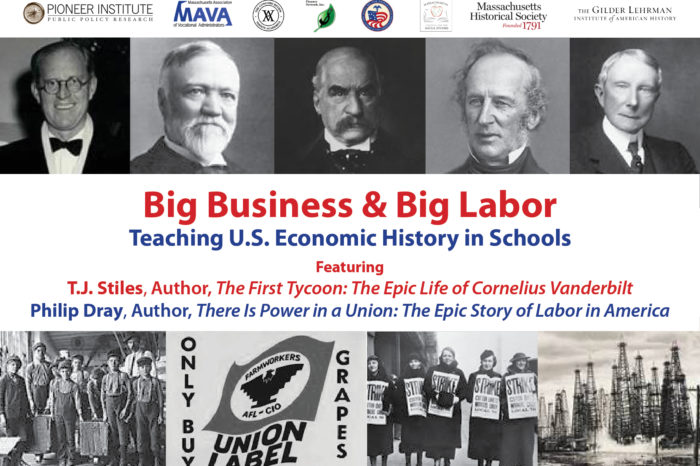Teaching U.S. Economic History In Schools Is Topic Of Pioneer Forum
Monday, January 25 event “Big Business & Big Labor” to feature Pulitzer Prize, National Book Award, and Robert F. Kennedy Book Prize-winning historians
Contact Jamie Gass, 617-723-2277 ext. 210 or jgass@pioneerinstitute.org
A Pulitzer Prize and National Book Award winner, and a recipient of the Robert F. Kennedy Book Prize will deliver keynote addresses at Pioneer Institute’s forum “Big Business & Big Labor: Teaching U.S. Economic History in Schools,” to be held Monday, January 25, 8:00-10:45 a.m. at the Omni Parker House hotel in Downtown Boston.
One keynote address will be delivered by T.J. Stiles, biographer. His book, The First Tycoon: The Epic Life of Cornelius Vanderbilt, won a National Book Award and the 2010 Pulitzer Prize for Biography or Autobiography.
Philip Dray will deliver the second keynote. He was awarded the Robert F. Kennedy Book Prize in 2003 for At the Hands of Persons Unknown: The Lynching of Black America. National Public Radio selected his 2010 publication, There is Power in a Union: The Epic Story of Labor in America, as among the Top 5 Books of the Year.
The keynote addresses will be followed by a panel to be moderated by David Nasaw, the Arthur M. Schlesinger, Jr. Professor of History at the Graduate Center of the City University of New York. Professor Nasaw is the author of The Patriarch: The Remarkable Life and Turbulent Times of Joseph P. Kennedy, Andrew Carnegie, and The Chief: The Life of William Randolph Hearst. He is also past president of the Society of American Historians.
Panelists will include Miriam Pawel, Maury Klein, Kerry Dunne, and Jim Sunderland. Pawel is the definitive biographer of Cesar Chavez and the American Farm Workers. Her book, The Crusades of Cesar Chavez – A Biography, won the Robert F. Kennedy Book Prize, the California Book Award, and was a finalist for the National Book Critics Circle Award.
Maury Klein is one of the nation’s foremost business and economic historians. He is the author of 18 books and innumerable articles in both scholarly journals and popular magazines. In 2014, he was awarded a New York/New England Emmy for best writing for the documentary “Railroad Man: The Life and Legend of Jay Gould,” which is based on his biography of Gould.
Kerry Dunne is the Director of History & Social Studies for the Boston Public Schools and serves on the board of the Massachusetts Council for the Social Studies. Jim Sunderland is a teacher of Modern U.S. History and Foundations of America at Bedford High School and was honored by the New England History Teachers’ Association with the Kidger Award for Outstanding History Teacher in 2010.
Welcome remarks will be delivered by Pioneer’s Distinguished Senior Fellow in Education and former Massachusetts Senate President Tom Birmingham, who co-authored the commonwealth’s landmark 1993 Education Reform Act. Mr. Birmingham is a Rhodes Scholar.
The event is co-sponsored by the Massachusetts Association of Vocational Administrators, The Concord Review, the Learning Economics and Finance Network, Inc., We the People: The Citizen and the Constitution, the Massachusetts Council for the Social Studies, the Massachusetts Historical Society and The Gilder Lehrman Institute of American History.
Stiles, Dray, Nasaw, Pawel, and Klein will be available to sign their books at the conclusion of the event. The event will be webcast live, here.
Pioneer supports the full preservation of the Bay State’s nationally-recognized U.S. history curriculum frameworks and the restoration of passage of the U.S. history MCAS test as a high school graduation requirement for public school students in Massachusetts. This forum is the latest in a series about how critical events in American history are taught in public schools. Earlier forums on topics like the Founding Era, Women’s History, The Civil War, World War II, the Cold War, and the Civil Rights Movement featured a number of Pulitzer Prize winners.
Pioneer has also kicked off its third annual Frederick Douglass Essay Contest, which will award nearly $10,000 in prizes. Student essays of six-to-eight pages on the topic of innovation are due on March 7. Winner and runner-up presentations will take place on April 6.



